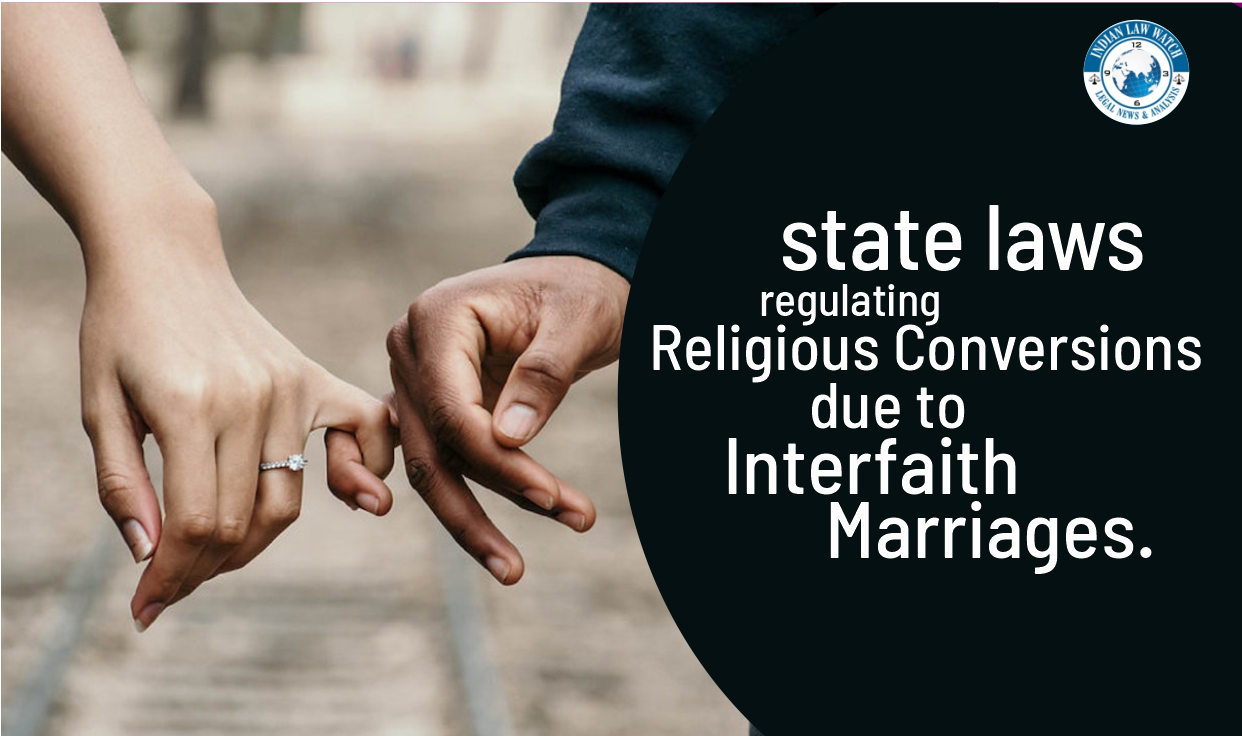
 India’s state-level anti-conversion laws that have been enacted in 8 Indian states to regulate religious conversions. The enforcement of these anti-conversion laws in these states namely Arunachal Pradesh, Odisha, Madhya Pradesh, Chhattisgarh, Gujarat, Himachal Pradesh, Jharkhand, and Uttarakhand and the online reports mention the varied state laws are in fact similar in their content and structure. Further, the plea before the Supreme Court and high courts are considering both the misuse and constitutionality of these recently issued laws and ordinances.
India’s state-level anti-conversion laws that have been enacted in 8 Indian states to regulate religious conversions. The enforcement of these anti-conversion laws in these states namely Arunachal Pradesh, Odisha, Madhya Pradesh, Chhattisgarh, Gujarat, Himachal Pradesh, Jharkhand, and Uttarakhand and the online reports mention the varied state laws are in fact similar in their content and structure. Further, the plea before the Supreme Court and high courts are considering both the misuse and constitutionality of these recently issued laws and ordinances.
The Supreme Court said it would hear on February 3, 2023 a batch of pleas challenging controversial state laws regulating religious conversions due to interfaith marriages. The bench had noted that there were at least five such pleas before the Allahabad high court, seven before the Madhya Pradesh high court, two each before the Gujarat and Jharkhand high courts, three before the Himachal Pradesh high court, and one each before the Karnataka and Uttarakhand high courts, and said a common petition for their transfer can be filed. It had sought the attorney general’s assistance on the plea filed by advocate Ashwini Kumar Upadhyay.
The apex court had, on January 6, 2021, agreed to examine certain new and controversial laws of Uttar Pradesh and Uttarakhand, regulating religious conversions due to interfaith marriages. The Uttar Pradesh law relates to not only interfaith marriages but all religious conversions and lays down elaborate procedures for anyone who wishes to convert to another religion. The Uttarakhand law entails a two-year jail term for those found guilty of religious conversion through “force or allurement”. The allurement can be in the form of cash, employment or material benefits. The plea filed by the NGO has alleged that the legislations violate articles 21 and 25 of the Constitution as those empower the state to suppress an individual’s personal liberty and freedom to practise the religion of his choice. The Jamiat Ulama-I-Hind has also moved the Supreme Court, challenging the anti-conversion laws of Uttar Pradesh, Madhya Pradesh, Gujarat, Uttarakhand and Himachal Pradesh.


-
During the brief hearing, senior advocate CU Singh, appearing in the court on behalf of NGO ”Citizens for Justice and Peace” of activist Teesta Setalwad, submitted that people cannot get married due to these state laws and the situation is very grave.
-
Attorney General R Venkataramani submitted that these are state legislations that have been challenged before the apex court and the high courts concerned should hear the cases. The top court had earlier asked the parties challenging the anti-conversion laws of several states to file a common petition seeking a transfer of the cases on the issue from various high courts to the apex court.
-
Solicitor General Tushar Mehta had challenged the locus standi of ”Citizens for Justice and Peace”, which is one of the petitioners. Mehta had not elaborated on the reasons for questioning the NGO’s locus.
-
The bench had noted that there were at least five such pleas ”before the Allahabad High Court, seven before the Madhya Pradesh High Court, two each before the Gujarat and Jharkhand high courts, three before the Himachal Pradesh High Court, and one each before the Karnataka and Uttarakhand high courts”, and said a common petition for their transfer can be filed.
-
It had asked ”Citizens for Justice and Peace” and the states of Uttar Pradesh, Madhya Pradesh, Uttarakhand and Himachal Pradesh to apprise it of the status of the cases challenging the state laws on conversion through marriage.
-
The Supreme Court on Friday refused a plea to refer to the Law Commission of India the question whether “forcible conversion” should be made a separate offence relating to religion under the Indian Penal Code.
-
Before Independence: The British did not enact any law. But many princely states did. Post independence such laws were dropped for want of support.
-
The next date of hearing in the religious conversions case was on March 17, 2023. The Supreme Court adjourned to July 18, 2023. The Court refused to pass an order staying the anti-conversion law of Himachal Pradesh at this stage.






